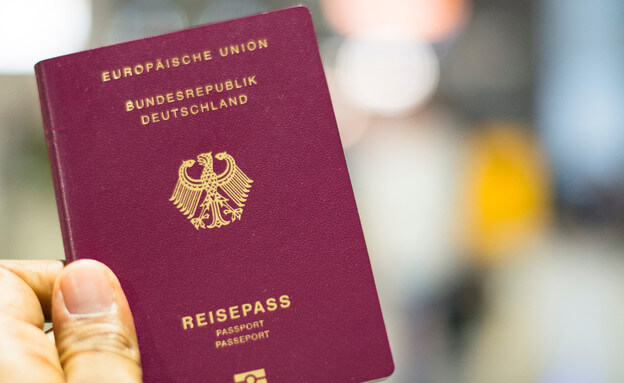New legislation has introduced more lenient conditions for issuing Austrian and German passports.
In recent years, a number of European countries have relaxed their citizenship laws concerning descendants of Holocaust survivors.
Consequently, hundreds of thousands of Israelis and Jews around the world may now become naturalized Austrian and German citizens and obtain a coveted European passport.
While naturalization requirements have been eased, in some cases the procedure for acquiring citizenship has become more complex and intricate.
At the same time we are witnessing far-reaching and ongoing changes in the naturalization law vis-à-vis descendants of Holocaust survivors.
This constitutes an unprecedented shift, the purpose of which is to atone for Austrian and German roles in past atrocities by replacing that legacy with a legal framework which aims to rectify the grave injustice suffered by countless Jews.
In 2019, Austria was the first to promote a new legal framework designated exclusively for descendants of victims of Nazi persecution.
Within this framework, nearly all the restrictions which in the past prevented most Austrian Jews, whether citizens or only residents, from obtaining citizenship, were abolished, and today Austria places very few obstacles in their path.
It may be said that obtaining citizenship has become significantly easier for those who meet the new criteria.
In August 2021 Germany also decided to comprehensively change the basic law pertaining to Holocaust survivors.
The revised law likewise substantially eases the path to obtaining citizenship by extending eligibility to the descendants of German residents and not only to those of its citizens.
As aforesaid, this broad initiative, which is being pursued by both countries, applies specifically to descendants of victims of the Nazi persecution.
Many Jews were forced to flee Germany following the rise of the Nazi Party to power on January 30, 1933.
Nazi influence over its German-speaking neighbor Austria was immediate, and tens of thousands of Jews were also forced to flee from there due to worsening conditions and manifestations of antisemitism.
Today, all individuals who left the two countries after 30.1.1933, and their descendants, are eligible for a European passport.

Who is eligible under the new legislation?
Regarding Austria -the new regulations apply to victims of the Nazi regime who were Austrian citizens or only Austrian residents (within its modern borders) and who left it between 30.01.1933 and 15.05.1955 the year of Austrian independence.
Austrian law is currently being interpreted even more expansively, thus enabling citizenship to also be granted to descendants of Jews who were in labor camps within modern Austria during World War II, and, in some cases, even to Jews who arrived in displaced persons camps in modern Austria after World War II and remained there temporarily before continuing to the next destination.
Regarding Germany -The new regulations apply to victims of the Nazi regime and their descendants who were German citizens or residents and who left Germany between 30.01.1933 and 08.05.1945(the date on which the war ended).
It should be noted that the German authorities require irrefutable proof of the persecuted individual’s citizenship or residency in Germany after 30.1.1933.
Being born in Germany is not necessarily sufficient.
Clarification regarding proof of persecution How can persecution be proved?
The answer is simple: most Jews who left either country from 1933 onwards are classified as persecuted persons solely on the basis of their Jewish identity.
Formal proof of persecution is therefore unnecessary.
Some of those applying for citizenship still have in their possession documents belonging to the grandfather/grandmother who was a victim of the persecution.
In most cases, conclusive evidence of a historical German/Austrian connection must be established through archival research conducted in Germany and Austria.
What are the reforms enacted as a result of the new legislation in both countries?
We have compiled for you the key reforms which we have deemed appropriate to present.
While there are of course other fundamental amendments, these are the most prominent amongst them:
- Descendants of entitled residents – Applicants whose fathers or mothers were permanent residents of either country are also entitled (and not only descendants of citizens, as was the case in the past).
This applies even if the residents arrived before 1933.
The foregoing equally applies to anyone who submitted a request for naturalization and was rejected by the authorities. - Elimination of gender-dependent entitlement – There is nothing to prevent applicants whose mother or grandmother was a citizen of either country from obtaining citizenship.
This applies even if the mother divorced, lost her citizenship, or remarried. - Military Service – In Austria, applicants who serve as conscripted soldiers are not precluded from applying.
However, voluntary service – for example, in a standing army, shall lead to revocation of citizenship.
Nevertheless, applicants who served in a standing army in the past are not precluded from applying.
In Germany, service in a standing army does not preclude the naturalization process.
Service in a standing army between the years 2000 and 2010 precludes the process of obtaining citizenship by birth. - Entitled public sector employees – Public servants are not precluded from submitting an application.
This applies even if the work is or was partially performed outside of Israel. - Renunciation of current citizenship is unnecessary. There is no requirement to relinquish any other citizenship or citizenships which you hold.
However, Austrian citizenship shall be denied if an additional citizenship was obtained after the application for Austrian citizenship was submitted.
In Germany, there is no prohibition on acquiring citizenship in a member state of the European Union (after obtaining German citizenship), even if German citizenship already exists.
There is indeed a prohibition on acquiring any other citizenship which, without prior approval from the German authorities, will lead to the revocation of German citizenship. - No generational limitation exists – Descendants of the original citizenship holder may apply for citizenship independently, without having to first naturalize their parent.
Descendants include children, grandchildren, great-grandchildren, and great-great-grandchildren. - Exemption from language proficiency tests – Unlike in the past, there is no requirement for official exams or an interview in the German language.
- No German/Austrian residency requirement – Until recently, anyone seeking naturalization had to reside in the country for several years and to prove a close connection to the local culture and language.
With regard to descendants of Holocaust survivors, there is currently no requirement to reside in these countries.
In fact, there is no need to visit them at all, not even during the application process.
How long does it take to obtain citizenship?
The duration of the process varies between the two countries, and the Austrian authorities are disinclined to extend the application beyond a year and a half.
In Germany the process takes longer, partly due to the preponderance of applicants. The process may take around two years from the filing date of the application. This is because in most cases the authorities overseeing the application undertake a more thorough examination of the documents, which are collectively subject to additional bureaucratic approvals.
However, in both instances the average duration of the process may be exceeded. The main reason for this is the non-submission or incorrect processing of documents (“rejections”) However, with dedicated and professional handling by a skilled expert, there is no reason for such a situation to occur.
Documents for the process of obtaining German or Austrian citizenship
In order to officially initiate the process, a formal connection must be established between the family member upon whom the application is predicated and one of the countries which he came from. The reference here is to a document showing that the family member previously lived or resided in one of the countries. For example – birth certificates, divorce certificate, diploma from academic institutions, identity card, etc.
However, due to the circumstances in which Jews were forced to leave these countries, they were not always able to take these documents with them.
Conversely, even when they took the documents they have not always withstood the ravages of time and may have disintegrated or become blurred and difficult to decipher.
In such cases, genealogists and office staff in Germany and Austria who specialize in document tracing will locate and complete the missing documents.
Documents (primarily from Israel) proving propinquity are also required.
This reference here is to birth certificates, marriage and divorce certificates, registration extracts, and in certain cases, verification of personal status (such as paternity recognition for a child born to an unmarried mother, children born through surrogacy, etc.).
Reconstructing documents, such as birth certificates, from the Mandate period in Israel, can sometimes be extremely difficult.
These documents must be translated, notarized, and verified by an apostille obtained from both the Ministry of Foreign Affairs and the court.
Cost of obtaining citizenship
The cost of the process is determined by the documentation and evidence provided by the client, as well as the work involved in genealogical research, if required. For this reason, a joint application for the entire family may significantly reduce the costs for each family member. This step undoubtedly lowers costs and substantially shortens the waiting time.
There is a significant advantage for the client in consulting with an experienced law firm that provides a VIP service, including the collection of materials from archives and government authorities in Germany and Austria, continuous guidance for handling matters in Israel (file compilation, document collection, translations, notarizations, apostille certifications), and the expedited processing of the citizenship application through direct handling in Austria and Germany.
*The article was written with the assistance of Mr. Yehonatan Gavrielov.

